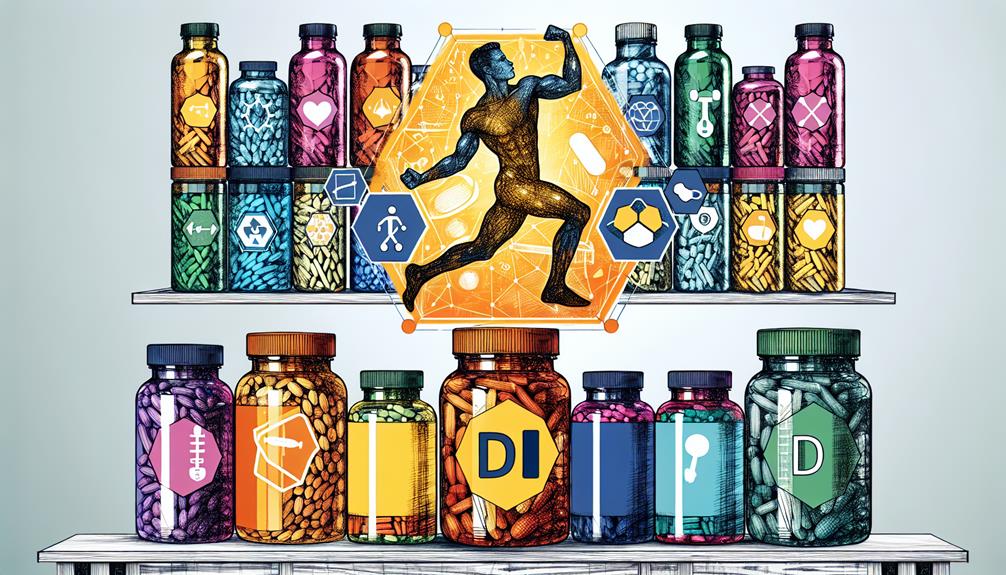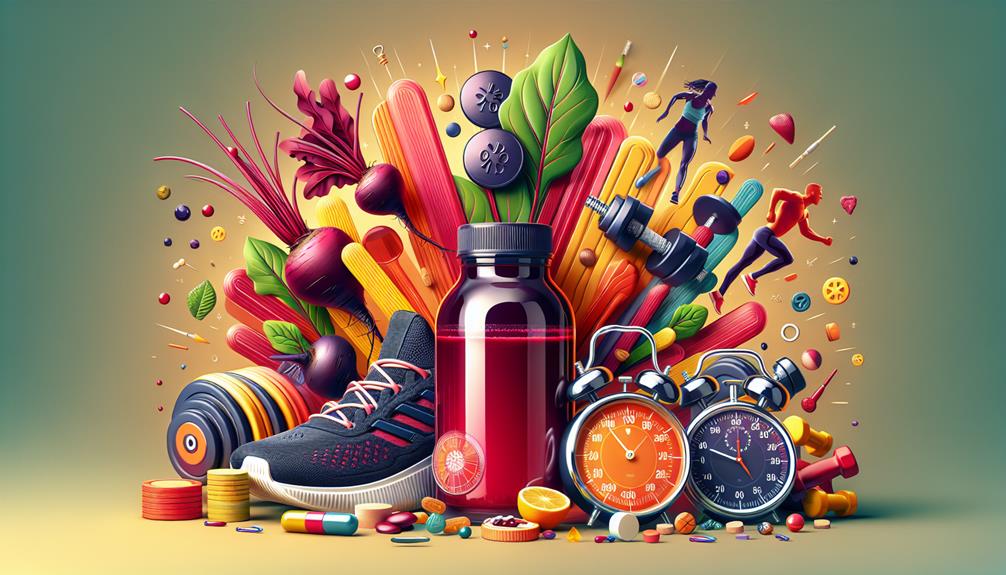When looking to optimize your athletic performance, focusing on the right vitamin and mineral supplements is crucial. From Creatine for muscle strength to Beta-Alanine for endurance, each supplement plays a key role in supporting different aspects of your training and health.
But what makes these supplements stand out among the rest? Understanding the science behind their impact on athletes can provide valuable insights into how they can elevate your performance to the next level.
Key Takeaways
- Creatine enhances muscle mass and power, with loading and maintenance phases to optimize effects.
- Beta-Alanine improves exercise capacity, delays fatigue, and enhances endurance without significant side effects.
- Vitamin D supports bone health, muscle function, and overall athletic performance, crucial for injury prevention.
- Iron is essential for oxygen transport, energy levels, and athletic function, especially for menstruating females.
Creatine for Muscle Strength
If you're looking to enhance your muscle strength, consider incorporating creatine supplementation into your regimen. Creatine is a widely used supplement known for its ability to improve muscle mass and power, especially beneficial for individuals engaging in short-term high-intensity exercises and explosive movements.
When it comes to creatine supplementation, the dosage is crucial. It's recommended to go through a loading phase where you consume around 20 grams per day for 5-7 days to saturate your muscles, followed by a maintenance phase of 3-5 grams per day to keep levels elevated.
It's important to note that not everyone responds to creatine in the same way. Approximately 20-30% of individuals are considered non-responders, experiencing little to no benefits from supplementation. Additionally, athletes participating in sports with weight classes should be mindful of the potential impact of creatine on body weight due to its ability to increase water retention within muscles.
Beta-Alanine for Endurance
Consider incorporating Beta-Alanine supplementation into your regimen to enhance your endurance and exercise capacity. Beta-Alanine is a supplement known for improving exercise capacity and delaying muscle fatigue. It achieves this by enhancing muscle firing rate, making it particularly beneficial for high-intensity activities.
The recommended daily dosage of Beta-Alanine typically falls within the range of 3-6 grams, providing optimal benefits for athletes. While some users may experience a harmless tingling sensation, especially at higher doses, the advantages for performance enhancement outweigh this minor side effect.
Adding Beta-Alanine to an athlete's regimen can significantly boost overall performance and help reduce muscle soreness post-workout. With its proven benefits in enhancing endurance and delaying muscle fatigue, Beta-Alanine stands out as a valuable supplement for athletes looking to take their performance to the next level.
Vitamin D for Bone Health

Incorporate Vitamin D supplementation into your regimen to support bone health and optimize muscle function for peak athletic performance. Athletes rely on strong bones to endure the physical demands of training and competition. Vitamin D plays a crucial role in maintaining bone health by aiding in the absorption of calcium and promoting bone mineralization.
Moreover, adequate vitamin D levels are essential for optimal muscle function, which directly impacts athletic performance. Deficiency in vitamin D is prevalent among athletes, leading to increased injury risk and compromised muscle strength. Supplementing with vitamin D can help mitigate these risks, supporting bone density and overall athletic performance.
Iron for Oxygen Transport
Ensure optimal oxygen transport in your body during exercise by understanding the importance of iron supplementation for athletes. Iron plays a crucial role in oxygen transport, making it essential for athletes looking to enhance their performance. Without an adequate amount of iron, oxygen delivery to muscles can be compromised, leading to decreased performance and increased fatigue. Athletes, especially menstruating females, are more prone to iron deficiency due to higher iron needs from intense physical activity.
Supplementing with iron can help improve energy levels, overall athletic function, and combat the negative effects of iron deficiency. It's important for athletes to monitor their iron levels regularly and consult healthcare providers for proper supplementation guidance. By ensuring you have sufficient iron levels in your body, you can optimize oxygen transport, enhance your performance, and maintain peak physical condition during training and competitions.
Beetroot Juice for Nitric Oxide

To optimize your athletic performance and enhance oxygen delivery to your muscles, consider incorporating beetroot juice into your supplementation regimen. Beetroot juice is packed with nitrates, which the body converts to nitric oxide, improving blood flow and oxygen delivery to your muscles.
This boost in nitric oxide levels from beetroot juice enhances exercise efficiency by lowering the oxygen cost of low-intensity workouts. When it comes to high-intensity exercise, consuming beetroot juice can extend your time to exhaustion, ultimately enhancing your overall performance.
The vasodilatory effects of nitric oxide derived from beetroot juice also improve muscle contraction efficiency and power output. Athletes can benefit significantly from beetroot juice supplementation as it helps delay muscular exhaustion and boosts exercise capacity.
Frequently Asked Questions
What Are the Best Vitamins to Take for Athletes?
For athletes, the best vitamins to take are Vitamin D for performance, iron for energy, B12 for endurance, magnesium for muscle function, and folate for recovery. Make sure to consult a healthcare provider for personalized advice.
Should Athletes Take Vitamins and Minerals as Supplements?
You should consider taking vitamins and minerals as supplements to enhance your athletic performance and overall health. Consulting healthcare providers can help you determine if supplementation is needed to address any deficiencies and optimize your well-being.
What Is the Best Mineral Supplement for Endurance Athletes?
For endurance athletes, the best mineral supplement is magnesium. It supports muscle function, energy production, and oxygen delivery during exercise. Reduced muscle cramps, improved recovery, and enhanced performance are all benefits of proper magnesium intake.
What Is the Best Sports Supplement?
For optimal sports performance, your go-to supplement can be creatine, enhancing muscle mass and power. Beta-alanine reduces fatigue and boosts exercise capacity. Vitamin D supports immune health and muscle strength. Iron is essential for menstruating females, while beetroot juice aids energy production.
Conclusion
In conclusion, incorporating these top 5 vitamin and mineral supplements into your athletic routine can greatly benefit your performance and overall health.
From enhancing muscle strength with Creatine to improving endurance with Beta-Alanine, these supplements provide essential nutrients to support your training and recovery.
Remember to consult with a healthcare professional before adding any new supplements to your regimen to ensure they're safe and effective for your individual needs.
Stay strong, stay healthy, and keep pushing towards your athletic goals!
I’m not just a supplement analyst. I’m an extremely qualified one! I am a Certified Nutrition Coach (CNC) and actually received my certification directly from the National Academy of Sports Medicine. I am also a Nutrition & Wellness Consultant, certified by the American Fitness Professionals Association (AFPA).


